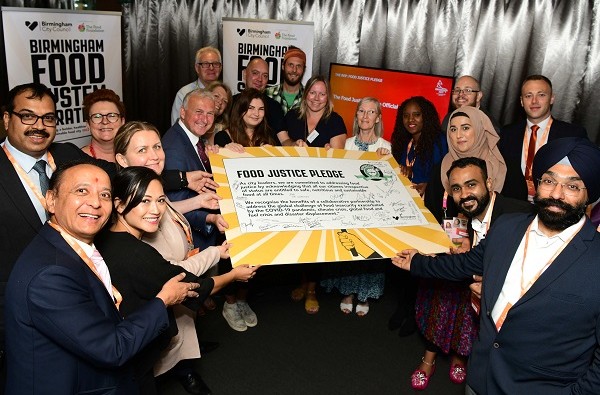MUFPP is an international agreement on urban food policies signed by over 200 cities from all over the world. Birmingham City Council has been serving as an MUFPP Steering Committee member for the past two years.
The GFJP was developed in response to the lessons learned on food insecurity during the COVID-19 pandemic. The pledge aims to encourage collaboration and collective working, empowering the voices of cities nationally and internationally. It emphasises the need for cross-cutting policies to create and support an affordable, nutritious and sustainable food system for all citizens, irrespective of social or economic resource.
This year, several resources have been created by Birmingham City Council, in collaboration with the Food Foundation, to support signatories of the GFJP improve food justice in their local areas:
- GFJP intervention database – comprises of examples of strategies, policies and interventions that have been implemented worldwide to tackle issues of food injustice. These can be used as examples of best practice for local policy makers who may want to implement interventions locally.
- Food justice pledge self-assessment tool – designed to assist local policymakers in understanding their current efforts in addressing food insecurity and identifying potential areas for action.
- Platform to share case studies – submission of case studies of interventions designed to improve food injustice by signatory cities to share best practice.
These resources are designed around five key themes of food justice: governance, social and economic equity, food production, food supply and distribution and food waste and recycling.
Councillor Sharon Thompson, Deputy Leader of Birmingham City Council, said “We, as a city, had the honour of signing the Global Food Justice Pledge with other cities from across the world at the Food Futures 2022 Conference that took place in Birmingham during the Commonwealth Games. We committed by signing the pledge, to addressing food injustice in our respective cities, acknowledging that all our citizens, irrespective of status, are entitled to nutritious and suitable food at all times. The Global Food Justice Toolkit will support signatory cities to act on this pledge, enabling a collaborative food justice revolution for a brighter, healthier, and fairer future for our global citizens.”
Dr Justin Varney, Director of Public Health, said: “Food can both support healthier lives and cause health problems. It is how we celebrate and reflect our heritage and culture and is a fundamental part of daily life. Being unable to feed those we love and care for is hugely damaging and food insecurity is a growing public health issue. This is especially in cities who lack growing space as housing density increase and often support some of the most vulnerable and economically precarious populations. This pledge and the tools and resources that support it will allow us to work together as cities to address food justice and tackle food insecurity in our urban settings.”
The GFJP resources will be launched at the Eurocities Working Group on Food on September 28th and at Birmingham’s Food System Strategy Launch Conference on October 13th. To learn more about how to get involved with strategy delivery please visit Food Revolution.














